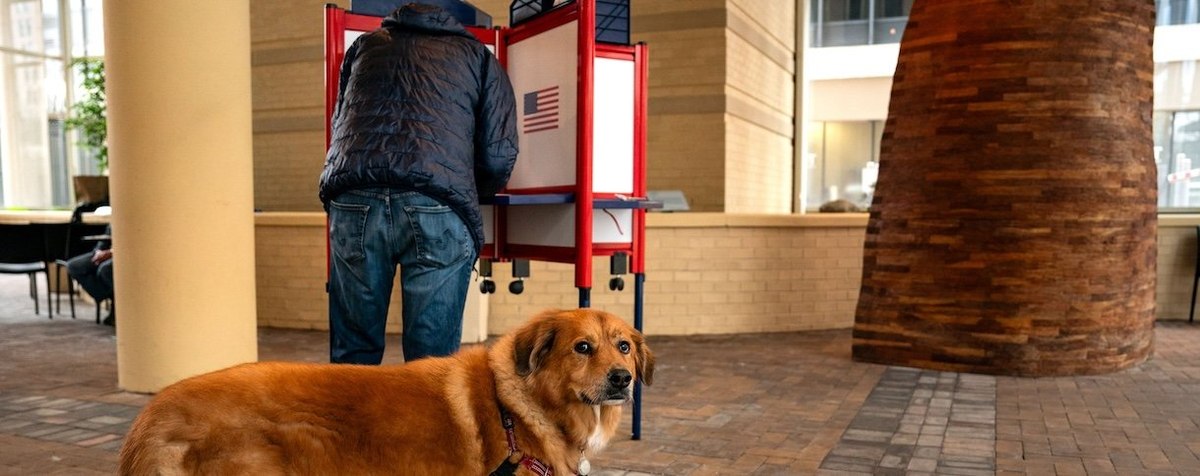The 2024 presidential election is fast approaching, but are Americans paying attention yet? A new YouGov poll asked Americans whether they are following the election and measured how much they know about the current state of the race.
Most Americans (63%) read or hear news about the election at least weekly, but only 35% actively seek out election news. Americans are more likely than not to know that someone has unofficially won each of the major-party presidential nominations, but they are less sure whether the Democratic vice presidential candidate has (33%) or has not (38%) been announced (she has). Most Americans (86%) know that Donald Trump has been on trial for a crime in 2024, but 25% incorrectly thought he had already been convicted of a crime — according to a poll conducted weeks before he was.
How much do Americans know about the election?
Most Americans (61%) know that the Republican Party controls the House of Representatives, and a similar proportion (60%) know that the Democratic Party controls the Senate. For each chamber, about 40% of Americans either think it is controlled by the opposite party or are unsure which party controls it. For example, 20% of Americans are unsure which party controls the House, and 19% think the Democrats control the House.
Americans with college degrees are more likely than those without one to correctly identify which party controls each chamber. 72% of Americans with college degrees know that Democrats control the Senate, compared to 54% of those without college degrees. The knowledge gap about control of the House is about as large between Americans with and without college degrees.
Most Americans (54%) know that someone has unofficially won the Republican nomination for president, and 51% know that someone has unofficially won the Democratic nomination. For each party, about 20% of Americans do not think the party has unofficially selected nominees; others named someone else or said they were unsure. Large majorities of Americans who know that each party has unofficial nominees correctly identify Donald Trump (82%) and Joe Biden (84%) as those nominees.
Americans are more certain about the 2024 Republican vice presidential candidate. Most (66%) know that the 2024 Republican vice presidential candidate has not been selected yet, and only 8% think the party already has chosen one. On the other hand, few Americans correctly say that the 2024 Democratic vice presidential candidate has been announced (33%), and 38% of Americans do not think the Democrats have announced their vice presidential candidate yet. Most Americans who think the Democrats have selected a vice presidential nominee correctly name Vice President Kamala Harris as the nominee (88%).
Only 55% of Americans know that the Democratic National Convention has not happened yet, and the same proportion know that the Republican National Election has not happened. In each case, about 40% of Americans don’t know whether the convention has happened yet.
Most Americans (86%) know that Trump has been on trial for a crime in 2024. But 25% of Americans incorrectly thought Trump had been convicted of a crime in 2024 weeks before he was. Democrats (31%) and Independents (30%) were much more likely than Republicans (15%) to think Trump had been convicted of a crime before his actual conviction.
Most Americans (54%) correctly think that Trump has been impeached, while 31% do not think he has ever been impeached. (Part of this low figure may be due to how impeachment is defined: Trump was impeached twice by the House but was not convicted either time by the Senate). Democrats (64%) are more likely than Independents (51%) and Republicans (47%) to know Trump has been impeached.
Majorities of Americans know that Biden has not been on trial for a crime in 2024 (84%), has never been impeached (86%), and has not been convicted of a crime in 2024 (84%). Independents are more likely than Democrats and Republicans to be unsure about these questions. For example, 18% of Independents are not sure whether Biden has ever been impeached, compared to 7% of Democrats and 8% of Republicans.
Despite their uncertainty about whether Trump has been convicted of a crime and about the current Democratic vice presidential nominee, Americans have a good idea of the policies supported by Democrats and Republicans. Majorities of Americans know that the Democratic Party is more supportive than the Republican Party of expanding government-subsidized health care (72%), strengthening gun control laws (72%), and using regulation to address climate change (71%). 57% know all three.
Also, majorities know that the Republican Party is more supportive of making immigration controls strict (74%) and increasing restrictions on abortion (73%). 64% know both. There is more uncertainty around party positions on cutting taxes. Most Americans see the Republican Party as more supportive of tax cuts (54%), but 22% see the Democrat Party as more supportive.
Are Americans following the election?
31% of Americans are paying “a lot” of attention to the 2024 presidential election, and another 32% are paying “some” attention to it. 13% are not paying any attention to the election. A slim majority (54%) care “a great deal” about who wins the 2024 presidential election, while only 6% do not care at all about who wins.
Most Americans read or hear news about the 2024 presidential election daily (36%) or weekly (28%). Another 10% engage with election news once or twice a month, while 22% read or hear election news less than that or never. Republicans (43%) are more likely than Democrats (34%) and Independents (31%) to see election news daily.
Americans are less likely to discuss the election than they are to hear news about it. Only 12% discuss the election with friends or family daily, while 26% do so weekly. 22% of Americans discuss the election less than once or twice a month and 18% never discuss it. Like with news consumption, Republicans (48%) are more likely than Democrats (36%) and Independents (31%) to discuss the election daily or weekly.
When it comes to news about the election, about one-third of Americans (35%) actively seek it out, while 16% actively avoid it. Half of Americans (49%) do neither. Older Americans are more likely than younger Americans to actively seek out election news: 49% of Americans 65 and older actively seek out election news, compared to only 24% of adults under 30.
Americans 65 and older also are much less likely than younger adults to avoid election news. Adults under 30 are more likely than other age groups to neither seek out nor avoid election news.
About half of Americans (49%) have consumed election-related news from television in the last month, while 46% have gotten election news from social media and 37% have gotten it from friends, family, or colleagues. News websites (34%) and apps (33%) are also popular sources of election information.
Adults under 30 are more likely than older Americans to get election news from social media. On the other hand, one-quarter (25%) of Americans 65 and older have gotten election news from print newspapers or magazines in the last month, compared to about 10% in other age groups.
See the results for this YouGov poll
Methodology: This poll was conducted online on April 30 - May 2, 2024 among 1,125 U.S. adult citizens. Respondents were selected from YouGov’s opt-in panel using sample matching. A random sample (stratified by gender, age, race, education, geographic region, and voter registration) was selected from the 2019 American Community Survey. The sample was weighted according to gender, age, race, education, 2020 election turnout and presidential vote, baseline party identification, and current voter registration status. Demographic weighting targets come from the 2019 American Community Survey. Baseline party identification is the respondent’s most recent answer given prior to November 1, 2022, and is weighted to the estimated distribution at that time (33% Democratic, 31% Republican). The margin of error for the overall sample is approximately 3.5%.
Image: Getty (Kent Nishimura / Stringer)










